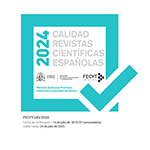Colombian political refugees in Spain: contributions to the field of Social Work from gender and intercultural perspectives
Abstract
The purpose of this article is to provide knowledge in the field of social work, specifically in terms of its practice with women and group intervention with a gender and intercultural focus. Based on the idea that all knowledge is situated, this feminist research underlines the importance of thinking from the perspective of the lives of excluded groups, in this case of Colombian refugees exiled in Spain, in order to make visible their contributions to the defence of human rights, to sustainable human development, and to overcoming vulnerability, through processes of empowerment and creation of support networks. There is reflection on the complexity of political refuge and on its associative practices. Though the drama of exile is an element that affects their life pathways and places them in a subordinate position, the article analyses refugees’ strategies for resistance, resilience and empowerment through activism via associations and platforms. It thereby examines the meaning of diversity as a characteristic that is inherent to contemporary society, in which we coexist with people of diverse cultures, values, religious beliefs, ethnic and gender identities, sexual orientations, social practices, political ideologies and lifestyles, and in particular the meaning of contributions from Colombian refugees settled in Spain.Downloads
Article download
License
In order to support the global exchange of knowledge, the journal Cuadernos de Trabajo Social is allowing unrestricted access to its content as from its publication in this electronic edition, and as such it is an open-access journal. The originals published in this journal are the property of the Complutense University of Madrid and any reproduction thereof in full or in part must cite the source. All content is distributed under a Creative Commons Attribution 4.0 use and distribution licence (CC BY 4.0). This circumstance must be expressly stated in these terms where necessary. You can view the summary and the complete legal text of the licence.









